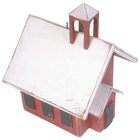The ugly vacant lot next to the post office would make a wonderful community park for weary pedestrians, a community garden or a space for children to play. It needs to be cleaned up and put in order before it can be used for anything, however. Somebody should do something--and perhaps that somebody is you.
Contact local authorities to determine whether you have permission to beautify the area. The mayor's or clerk's office can help you. The piece of land you wish to beautify may have an owner who is either hostile or receptive to your idea. You need to know before trespassing on private property, no matter how unattractive it may be. In the case of community-owned land, permission is also needed. Community officials may be able to guide you to projects you hadn't thought of doing as well as helping you with ones you've identified.
Find out if there is community help for your project. Your town may welcome your picking up trash on the banks of a local stream. If so, find out whether the Department of Public Works can help with trash containers or special trash pickup. Find out how your community handles a volunteer being injured; in some communities, registration and a hold-harmless waiver are required for community work projects.
Form a project-organizing group. Volunteers work best when chores are clearly outlined ahead of time and the supplies they need are ready at hand. You may need different people to recruit volunteers from likely community organizations, schedule work shifts, purchase supplies, publicize the event, offer refreshments, and thank those who helped.
Recruit volunteers. For community beautification, be sure to contact groups like the local garden club, scout troops and youth service organizations. Let schools and houses of worship that require youth community service know that you welcome volunteers.
Schedule your event to maximize volunteer participation: in a busy community, this may mean dodging sports and other community events. Since beautification projects are often weather-dependent, plan a rain date or a way to reschedule.
Plan to spend a good deal of time in the last few days before your event answering questions, making sure of supplies, and reminding volunteers of their commitments. Cross your fingers for the weather, and have a great time.
Prepare for any necessary follow-up. First, make certain that all participating volunteers are thanked, whether by note, phone call or other means. (Sending pictures of volunteers to local papers with a caption describing the project sometimes works.) Second, coordinate any follow-up. If the Cub Scouts offer to do light trash patrol on your newly cleaned vacant lot once a month, help them make a schedule and stay in touch. Consider going back to your project on a seasonal or semi-annual basis.
Related Articles

How to Find Meaningful Volunteer ...

How to Organize a Clothing Drive

Humanitarian Project Ideas

Ideas on How to Organize a Fun Day for ...

How to Start a Motorcycle Ride Fund ...

How Can I Make Money for My Church?

How to Start a Fan Club

How to Survive Living in a Group Home

Simple Church Wedding Decorating Ideas

How to Donate Trophies to Be Refurbished

How to Find Lost Relatives

How to Calculate Church Rental Rates

How to Plan a Donation Drive for a ...

Church Nursery Requirements

How to Set Up a Church Visitation ...

How to Donate to Missionaries of Charity

Types of Volunteer Opportunities

Charitable Organizations That Will Help ...

Adult Mother & Daughter Day Ideas

Examples of Family Involvement ...
Writer Bio
Janet Beal has written for various websites, covering a variety of topics, including gardening, home, child development and cultural issues. Her work has appeared on early childhood education and consumer education websites. She has a Bachelor of Arts in English from Harvard University and a Master of Science in early childhood education from the College of New Rochelle.